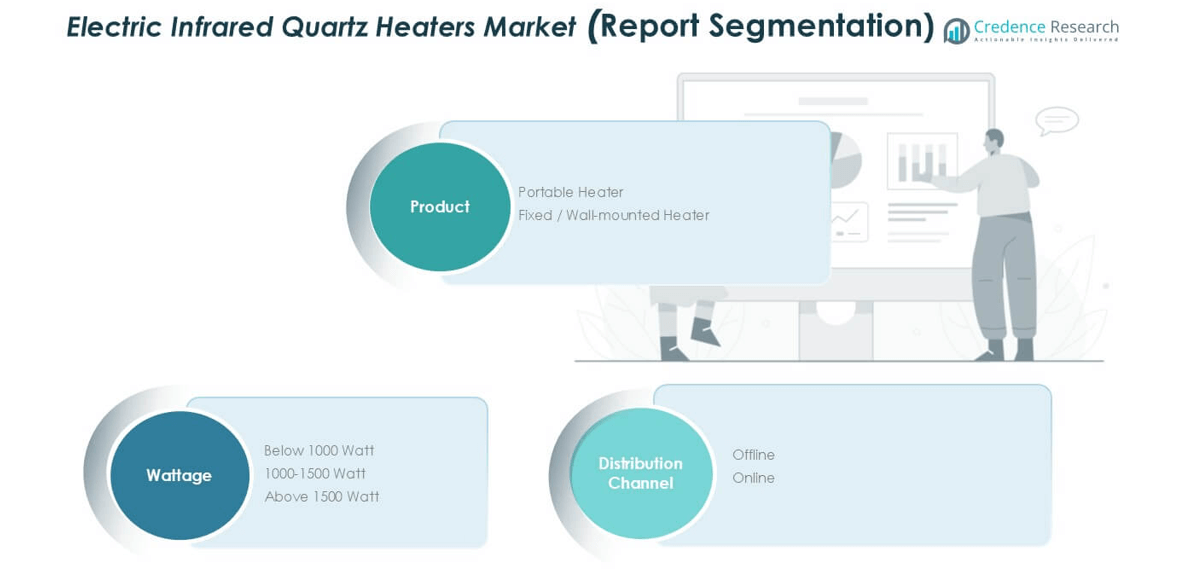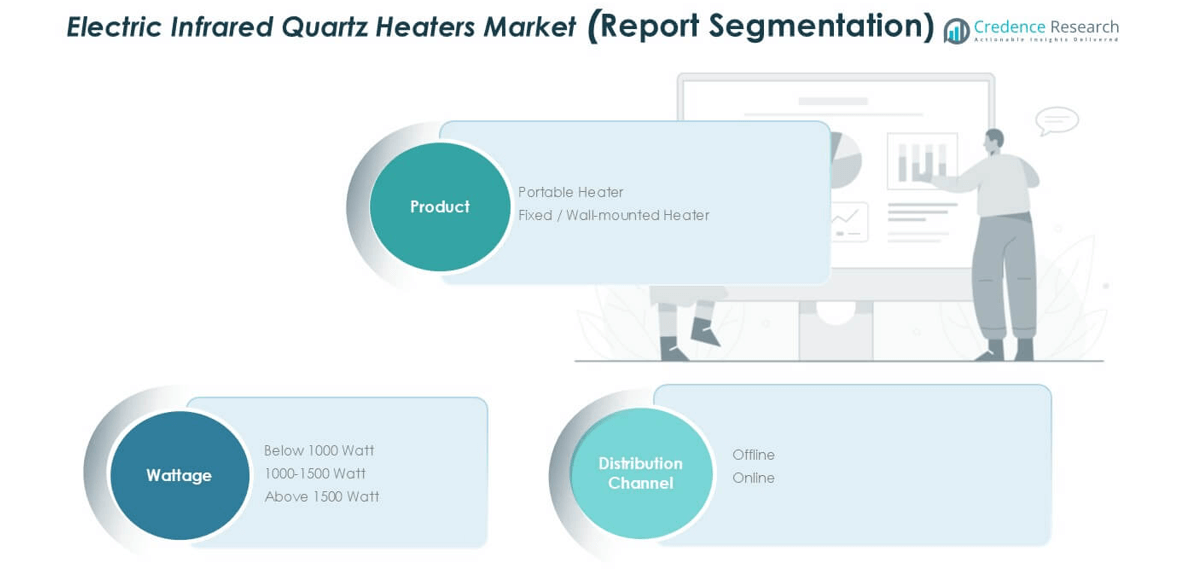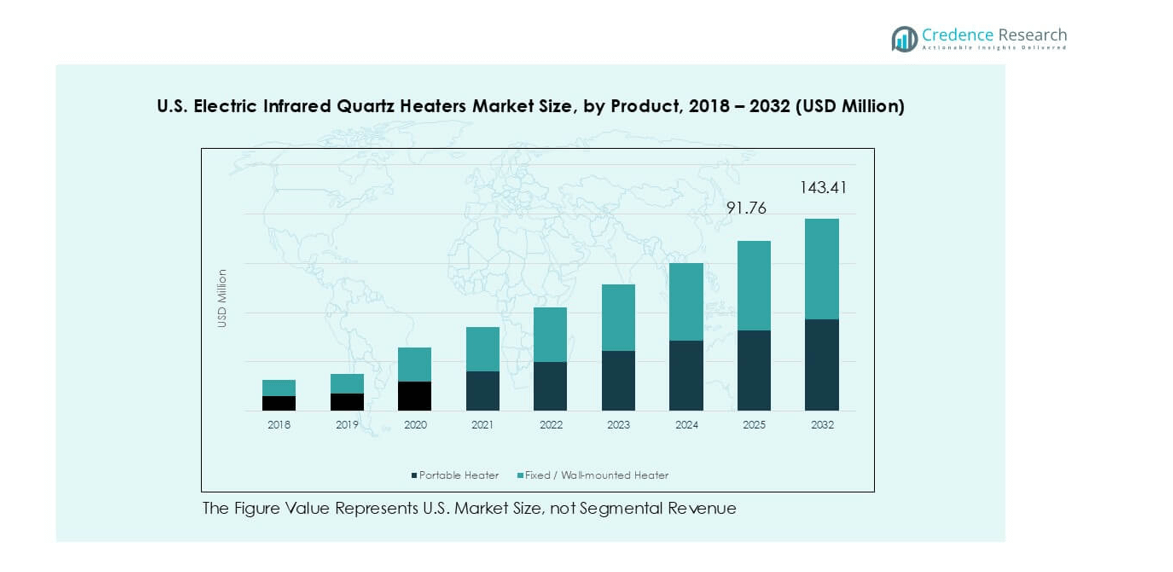Market Overview
The U.S. Electric Infrared Quartz Heaters market size was valued at USD 61.93 million in 2018, rising to USD 86.53 million in 2024, and is projected to reach USD 143.41 million by 2032, growing at a CAGR of 6.44% during the forecast period.
| REPORT ATTRIBUTE |
DETAILS |
| Historical Period |
2020-2023 |
| Base Year |
2024 |
| Forecast Period |
2025-2032 |
| U.S. Electric Infrared Quartz Heaters Market Size 2024 |
USD 86.53 million |
| U.S. Electric Infrared Quartz Heaters Market, CAGR |
6.44% |
| U.S. Electric Infrared Quartz Heaters Market Size 2032 |
USD 143.41 million |
The U.S. electric infrared quartz heaters market is led by key players such as Backer Hotwatt, Inc., Honeywell International Inc., Lasko Products, LLC, TPI Corporation, and Duraflame, Inc., which dominate through advanced product innovation and wide retail presence. These companies focus on energy-efficient, portable, and smart-controlled heater models to meet growing residential and commercial demand. Emerging brands like Convectronics and BioSmart Solution are expanding their footprint through specialized and eco-friendly designs. Regionally, the Northeast U.S. accounted for the largest 28% market share in 2024, driven by colder climatic conditions and high adoption of compact, efficient heating systems across homes, offices, and hospitality sectors.

Market Insights
- The U.S. Electric Infrared Quartz Heaters market was valued at USD 86.53 million in 2024 and is projected to reach USD 143.41 million by 2032, growing at a CAGR of 6.44%.
- Rising demand for energy-efficient and cost-effective heating solutions is driving market growth, supported by increasing adoption in residential and commercial applications.
- Technological advancements such as smart thermostats, Wi-Fi connectivity, and enhanced safety features are shaping product innovation across leading brands.
- The market is moderately competitive, with major players like Backer Hotwatt, Honeywell, Lasko, and TPI Corporation focusing on smart and portable heaters, while new entrants emphasize affordability and eco-friendly designs.
- Regionally, the Northeast held the largest 28% share in 2024 due to cold winters, while the 1000–1500-watt segment led with 58% share, driven by balanced performance and energy efficiency across small to mid-sized spaces.
Access crucial information at unmatched prices!
Request your sample report today & start making informed decisions powered by Credence Research Inc.!
Download Sample
Market Segmentation Analysis:
By Product
Portable heaters dominated the U.S. electric infrared quartz heaters market in 2024, accounting for nearly 64% of the total share. Their popularity stems from easy mobility, compact design, and suitability for both residential and commercial applications. Consumers prefer portable models for spot heating in bedrooms, offices, and garages due to their plug-and-play convenience. The demand is further supported by energy-efficient models equipped with adjustable thermostats and safety features. Fixed or wall-mounted heaters hold a smaller share but are gaining traction in hospitality and commercial spaces for their aesthetic integration and space-saving benefits.
- For instance, Lifesmart LS-6BPIQH-X is a functional 1500W infrared quartz heater, the claim that it can effectively heat an area as large as 93 square meters is a marketing exaggeration.
By Wattage
The 1000–1500 Watt segment led the market in 2024, capturing about 58% of the total share. This range offers the ideal balance between energy efficiency and effective heating coverage, making it a preferred choice for medium-sized rooms. Consumers favor these models for their faster heating and moderate power consumption. The below 1000-watt category appeals to smaller spaces such as offices and compact living areas, while units above 1500 watts are mainly used in large rooms, workshops, or outdoor settings, where higher heat output is required for consistent performance.
- For instance, Dr. Infrared Heater’s DR-968 model delivers a 1,500W dual-element heating system producing 5,200 BTU/hour, effectively warming up to 37 square meters (400 square feet).
By Distribution Channel
The offline distribution channel held a dominant 67% share in 2024, supported by strong consumer trust in physical retail and the ability to test products before purchase. Home improvement stores, supermarkets, and specialized appliance outlets remain key sales points for brands. However, the online segment is growing rapidly due to expanding e-commerce platforms and competitive pricing. Consumers increasingly rely on online reviews and doorstep delivery convenience. Promotions, bundled offers, and easy return policies from leading platforms are further accelerating digital sales, particularly among younger and urban consumers.
Key Growth Drivers
Energy Efficiency and Cost Savings
The growing focus on energy efficiency is a major driver of the U.S. electric infrared quartz heaters market. Consumers and businesses increasingly prefer heating systems that reduce power consumption without compromising comfort. Infrared quartz heaters convert almost all electrical energy into radiant heat, minimizing energy loss compared to conventional heaters. Rising electricity costs and stricter energy regulations have prompted manufacturers to design models with programmable thermostats and eco modes. These advancements enhance efficiency and reduce operational expenses. The surge in smart home integration also boosts adoption, as users can remotely monitor and adjust heating for optimal energy use.
- For instance, Dr. Infrared Heater’s DR-998 model combines infrared quartz and PTC elements with an eco-mode that limits power use to 1,000 W once the set temperature is achieved.
Rising Demand for Portable and Compact Heating Solutions
The strong consumer shift toward flexible and space-saving heating appliances drives market growth. Portable infrared quartz heaters are ideal for small homes, offices, and apartments, aligning with the rising trend of compact living spaces in urban areas. Their easy mobility, plug-and-play setup, and affordability attract residential users seeking efficient spot heating. The increased adoption of work-from-home setups further amplifies demand for localized heating rather than centralized systems. Manufacturers are also introducing lightweight and aesthetically appealing models that complement modern interiors. Combined with enhanced safety features, portability continues to be a key factor in the market’s steady expansion across multiple end-user segments.
- For instance, LifeSmart introduced a 1500-watt infrared quartz heater, typically weighing between 4.9 and 5.6 kilograms, and capable of providing supplemental heat for a well-insulated room up to 14 to 18 square meters (150–200 square feet).
Technological Advancements and Smart Integration
Technological progress in heating control and design has significantly boosted the appeal of infrared quartz heaters. Modern models now feature digital thermostats, Wi-Fi connectivity, and compatibility with smart home systems, allowing users to manage heat output through smartphones or voice assistants. Integration with sensors and automation platforms enables precise temperature regulation and energy optimization. Manufacturers are also focusing on advanced safety features like tip-over protection and automatic shut-off mechanisms. Additionally, innovations in quartz tube materials improve heat transfer efficiency and durability. These advancements enhance product reliability and attract environmentally conscious consumers, reinforcing the market’s long-term growth potential.
Key Trends & Opportunities
Growing Adoption of Smart and Connected Heating Devices
Smart home adoption is rapidly transforming the U.S. heating appliance landscape. Infrared quartz heaters equipped with IoT connectivity and AI-driven control systems are gaining momentum. Consumers increasingly seek convenience, real-time energy tracking, and automation that align with sustainable living goals. Manufacturers are leveraging data analytics and app-based interfaces to enhance personalization and efficiency. The integration of such devices with smart thermostats and voice control platforms like Alexa and Google Home supports widespread adoption. This trend presents opportunities for companies to expand their premium product portfolios and strengthen their presence in tech-savvy households.
- For instance, Dyson launched the Pure Hot+Cool Link heater with Wi-Fi and AI-enabled sensors that automatically adjust heat levels based on air quality and occupancy.
Expansion in Commercial and Outdoor Applications
Rising use of infrared quartz heaters in commercial and outdoor settings offers promising growth opportunities. Restaurants, warehouses, patios, and event spaces are increasingly installing high-capacity heaters for targeted warmth and energy savings. Unlike traditional convection systems, infrared quartz technology provides instant heat, even in open or semi-open environments. Seasonal demand during colder months and growing investments in outdoor dining and recreational facilities further support market expansion. Manufacturers are introducing weather-resistant, high-output models designed for durability and safety, expanding the technology’s reach beyond residential spaces into hospitality, industrial, and retail applications.

Key Challenges
High Operational and Replacement Costs
Despite efficiency benefits, the high initial and replacement costs of electric infrared quartz heaters pose a significant challenge. Advanced models with smart features and premium materials increase upfront investment, limiting adoption among price-sensitive consumers. Additionally, the quartz tubes used in these heaters require periodic replacement, adding to maintenance expenses. In commercial and industrial applications, energy use can rise sharply during extended operation, impacting total ownership cost. These factors may hinder broader penetration, especially when low-cost heating alternatives remain available in the market. Manufacturers must focus on improving durability and affordability to overcome this barrier.
Safety Concerns and Limited Awareness
Safety-related issues and limited consumer awareness about proper usage continue to restrict market potential. Although modern heaters include safety features like automatic shut-off and tip-over protection, improper placement or prolonged use can cause overheating risks. Consumers often underestimate ventilation requirements or surface clearances, leading to potential hazards. Moreover, lack of understanding about infrared heating efficiency compared to convection systems slows adoption. Manufacturers and retailers are increasingly investing in awareness campaigns and user education to build trust. Addressing these safety perceptions is essential to ensure sustained market growth and customer confidence.
Regional Analysis
Northeast U.S.
The Northeast held a 28% share of the U.S. electric infrared quartz heaters market in 2024, driven by its long winters and high heating needs. States like New York, Pennsylvania, and Massachusetts show strong adoption across both residential and commercial spaces. Consumers prefer portable and wall-mounted models to supplement central heating. Increased demand in hospitality and retail sectors also supports growth. Energy efficiency standards and awareness of low-emission heating systems further enhance market penetration, while smart home integration trends continue to strengthen regional demand.
Midwest U.S.
The Midwest accounted for 25% of the market share in 2024, supported by harsh winter climates and expanding use of supplemental heating systems. States such as Illinois, Michigan, and Ohio show consistent growth in portable heater sales for homes, garages, and small offices. The agricultural and industrial sectors increasingly deploy infrared heaters for energy-efficient space heating. Rising energy costs and technological innovations like digital thermostats encourage replacement of older units. Demand remains particularly strong in suburban and rural areas where consumers value quick, targeted heating during peak winter seasons.
South U.S.
The South represented 22% of the market share in 2024, driven by increasing awareness of energy-efficient heating in mild but variable climates. States including Texas, Florida, and Georgia are experiencing growing adoption for both indoor and outdoor applications. The rise in commercial and hospitality infrastructure, such as restaurants and patios, has spurred demand for weather-resistant infrared heaters. Product availability through large retail networks and online platforms supports strong sales growth. Consumers also favor compact, portable models for versatility across residential and light commercial uses.
West U.S.
The West held a 25% share of the market in 2024, led by states like California, Washington, and Oregon. Demand is supported by cold coastal winters and a strong focus on sustainable, low-emission heating technologies. The region’s advanced retail ecosystem and early adoption of smart home systems boost sales of connected heater models. Outdoor applications—such as patio heating in restaurants and entertainment venues—drive steady market growth. Supportive state-level energy-efficiency policies and preference for eco-friendly products position the West as a key innovation hub for next-generation infrared quartz heaters.

Market Segmentations:
By Product
- Portable Heater
- Fixed / Wall-mounted Heater
By Wattage
- Below 1000 Watt
- 1000–1500 Watt
- Above 1500 Watt
By Distribution Channel
By Geography
- Northeast U.S.
- Midwest U.S.
- South U.S.
- West U.S.
Competitive Landscape
The competitive landscape of the U.S. electric infrared quartz heaters market is characterized by the presence of both established manufacturers and emerging domestic players focused on product innovation and energy efficiency. Leading companies such as Backer Hotwatt, Inc., Honeywell International Inc., Lasko Products, LLC, and TPI Corporation dominate the market through diversified product portfolios and strong distribution networks. These firms invest heavily in research and development to integrate smart controls, safety features, and eco-friendly designs. Smaller players, including Convectronics, BioSmart Solution, and Intelligent Heater, are gaining traction with cost-effective and portable solutions targeting residential consumers. Strategic collaborations with e-commerce platforms and retail chains have enhanced brand visibility and accessibility. Additionally, companies emphasize compliance with energy efficiency standards and certifications to strengthen consumer trust. Increasing focus on design aesthetics, digital thermostats, and Wi-Fi-enabled models continues to shape competition, pushing the market toward advanced, user-friendly, and sustainable heating solutions.
Key Player Analysis
- Backer Hotwatt, Inc
- Convectronics
- Tempco Electric Heater Corporation
- Honeywell International Inc.
- Lasko Products, LLC
- TPI Corporation
- Solar Products Inc.
- Duraflame, Inc.
- BioSmart Solution
- Intelligent Heater
- Other Key Players
Recent Developments
- In August 2025, Pelonis is referenced as a key player in energy-efficient, budget-friendly heaters, with recent product updates focusing on improved safety features, digital controls, and portable formats to address shifting consumer demand in North America and Asia-Pacific.
- In 2025, Twin-Star International continued leading the U.S. electric fireplace and heater market, with innovations including the 3D Flame Effect, PanoGlow®, CoolGlow®, Safer Plug®, and Safer Sensor™.
Report Coverage
The research report offers an in-depth analysis based on Product, Wattage, Distribution Channel and Geography. It details leading market players, providing an overview of their business, product offerings, investments, revenue streams, and key applications. Additionally, the report includes insights into the competitive environment, SWOT analysis, current market trends, as well as the primary drivers and constraints. Furthermore, it discusses various factors that have driven market expansion in recent years. The report also explores market dynamics, regulatory scenarios, and technological advancements that are shaping the industry. It assesses the impact of external factors and global economic changes on market growth. Lastly, it provides strategic recommendations for new entrants and established companies to navigate the complexities of the market.
Future Outlook
- The market will experience steady growth driven by rising demand for energy-efficient home heating solutions.
- Smart and Wi-Fi-enabled heaters will gain wider adoption due to growing smart home integration.
- Manufacturers will focus on advanced safety features such as tip-over protection and auto shut-off systems.
- Portable heater models will continue to dominate due to increasing preference for flexible and compact designs.
- Commercial and outdoor applications will expand, particularly in hospitality and retail spaces.
- Technological innovation in quartz tube materials will enhance durability and heat transfer efficiency.
- Online distribution channels will grow rapidly, supported by convenience and promotional offers.
- Eco-friendly and low-emission heaters will see strong demand amid stricter energy regulations.
- Customizable temperature control and aesthetic designs will attract more residential consumers.
- Partnerships between manufacturers and retail networks will strengthen nationwide product availability and brand visibility.






